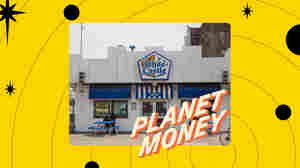Wanna go deeper? Subscribe to Planet Money+ and get sponsor-free episodes of Planet Money, The Indicator, and Planet Money Summer School. Plus access to bonus content. It's a new way to support the show you love. Learn more at plus.npr.org/planetmoney


Planet Money
From NPR
Wanna see a trick? Give us any topic and we can tie it back to the economy. At Planet Money, we explore the forces that shape our lives and bring you along for the ride. Don't just understand the economy – understand the world.
Wanna go deeper? Subscribe to Planet Money+ and get sponsor-free episodes of Planet Money, The Indicator, and Planet Money Summer School. Plus access to bonus content. It's a new way to support the show you love. Learn more at plus.npr.org/planetmoney
Most Recent Episodes
How useful, really, are the steps you can take after a data breach?
How useful, really, are the steps you can take after a data breach?
Ferns are growing where there used to be cattle pastures at the El Globo habitat bank and nature reserve in Antioquia, Colombia. In the background are hills that neighbors cleared for cattle pasture. Stan Alcorn/NPR hide caption
Economic sciences laureates James Robinson, Daron Acemoglu and Simon Johnson. Clément Morin/Nobel Prize Outreach hide caption
Willis C. Hawley (left) and Reed Smoot meeting shortly after the signing of the Smoot-Hawley Tariff Act. Library of Congress hide caption









